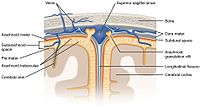
Photo from wikipedia
AIM We evaluated the prognostic value of serum- and cerebrospinal fluid (CSF)-ubiquitin carboxyl-terminal esterase L1 protein (UCHL1) measurements in post- post-out of hospital cardiac arrest (OHCA) patients treated with target… Click to show full abstract
AIM We evaluated the prognostic value of serum- and cerebrospinal fluid (CSF)-ubiquitin carboxyl-terminal esterase L1 protein (UCHL1) measurements in post- post-out of hospital cardiac arrest (OHCA) patients treated with target temperature management (TTM), to predict neurologic outcome. METHODS This was a prospective single-centre observational cohort study, conducted from April 2018 to September 2019. Serum- and CSF-UCHL1 were obtained immediately (UCHL1initial), 24h (UCHL124), 48h (UCHL148), and 72h (UCHL172) after return of spontaneous circulation (ROSC). The area under the receiver operating characteristic curves (AUROC) and Delong method were used to identify cut-off values of serum- and CSF-UCHL1initial, UCHL124, UCHL148, UCHL172 for predicting neurologic outcomes. RESULTS Of 38 patients enrolled, 16 comprised the poor outcome group. The AUROCs for serum- and CSF-UCHL1initial were 0.71 and 0.93 in predicting poor neurological outcomes, respectively (p=0.01). The AUROCs for serum- and CSF-UCHL124 were 0.85 and 0.91, (p=0.24). The AUROCs for serum- and CSF-UCHL148 were 0.90 and 0.97, (p=0.07). The AUROCs for serum- and CSF-UCHL172 were 0.94 and 0.98, (p=0.25). CONCLUSION Findings of this study demonstrate that CSF-UCHL1 measured immediately, 24h, 48h, and 72h after ROSC is a valuable predictor for evaluating neurologic outcomes, whereas serum-UCHL1 measured at 24h, 48h, and 72h after ROSC showed a significant performance in the prognostication of poor outcomes in post-OHCA patients treated with TTM.
Journal Title: Resuscitation
Year Published: 2020
Link to full text (if available)
Share on Social Media: Sign Up to like & get
recommendations!